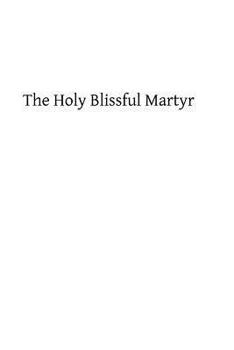The Holy Blissful Martyr: Saint Thomas of Canterbury
Select Format
Select Condition 
Book Overview
There is hardly any character in history that rouses such feeling as the character of Saint Thomas of Canterbury. On one side there are those who say that he was a tiresome fanatic-a fanatic because he glorified Church against State, and tiresome because he did this with regard to a number of trifling details involving no particular principle. On the other side there is the verdict of the Catholic Church that he lived a saint and died a martyr. Now it is perfectly natural, especially in these days, that there should be these two opinions, for there was scarcely ever a time when the State was more glorified at the expense of the Church. We are informed by thousands of voices that the State is the true" Church," that citizenship is the whole duty of man, and that all interests that conflict with patriotism or the service of "Humanity" are contemptible and treacherous. This movement, in England at least, began in the sixteenth century, when the country was separated from allegiance to Rome, and religion itself became more or less a department of the State; it is reaching its maturity now in the position that the State is all, and that religion, if it is in any sense "established," must conform utterly to the will of its protector. This view of the State has affected, as we know, even those who cling to Christianity. We have heard lately a chorus of English voices, from the throats of professing Christians, acclaiming recent events in France, and declaring that Pius X, through his selfassertive mediaevalism, is the sole cause of his own troubles. If he had only recognised the sanctity of the State and allowed his spiritual children to conform to its requirements in the matter of appeals and associations, all this anti-clericalism would have disappeared long ago Now here is almost the precise quarrel in which Thomas laid down his life. If Erastianism is right, certainly Saint Thomas was wrong. If it is proper that Edward VII should be even the nominal head-and by law he is much more-of an institution claiming to be Christ's Church; and that M. Fallieres should be the ultimate arbitrator between French priests and people; then it was equally proper for Henry II to insist upon the "Constitutions of Clarendon" and the" royal customs," and highly improper, as well as absurd, for St. Thomas to resist them. Certainly some of these constitutions and customs seem very trifling matters if they are judged by worldly standards. But Catholics believe that Christ's Kingdom is not of this world, and therefore cannot possibly, in the matter of her own constitution, be subject to secular control. They can no more, in the things of ecclesiastical government, consent to the substitution of appeals to a Privy Council, or any secular court, for appeals to the Holy Father, than they can consent to the supplanting of the Apostles' Creed by the syllabus of the London County Council. These things are very far from being trifling details to those who are seriously convinced that Jesus Christ founded one Church, of which they themselves are members, a Church with a divinely appointed hierarchy and a divinely revealed system of belief. The opposite view is, of course, perfectly natural for those who believe nothing of the kind. St. Thomas therefore will always stand as a symbol of the unceasing conflict between the world and the Church; and the fact that some of the principles for which he contended do appear even to some Catholics to be on the very borderline between "dogma" and "opinion," makes him all the more significant. It is one more illustration of his significance that it was he whom Henry VIII selected to attack, from all the saints of Catholic England, summoning him to appear, four centuries after his death, to answer to the charge of hightreason and disloyalty.
Format:Paperback
Language:English
ISBN:1483932850
ISBN13:9781483932859
Release Date:March 2013
Publisher:Createspace Independent Publishing Platform
Length:174 Pages
Weight:0.53 lbs.
Dimensions:0.4" x 6.0" x 9.0"
Customer Reviews
0 rating





